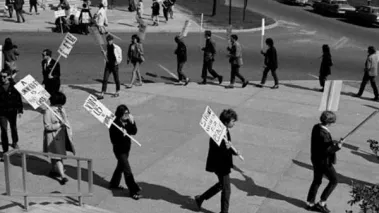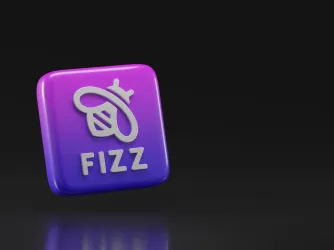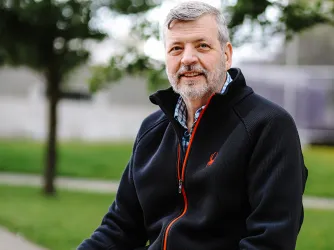Table of Contents
FIRE Q&A: First Amendment Attorney Daniel Silver of Landmark Supreme Court Case 'Healy v. James'

University of Connecticut Libraries /Thomas J. Dodd Research Center
Most law students can only dream that one day, a case they work on as a lawyer will end up before the Supreme Court of the United States. And that’s only, of course, after a long career working toward such a lofty goal. But for Daniel Silver, the recently-retired Connecticut First Amendment attorney, such a case was the very first one he ever worked on—first as a law student, and then as a young lawyer.
That case was Healy v. James, 408 U.S. 169 (1972), in which the Court first affirmed that public college students have the same First Amendment rights of free speech and association as ordinary citizens. It is a case oft-cited by FIRE for the proposition that students can associate and express themselves despite holding views “antithetical to the school’s policies,” or amid hypothetical concerns that the students might “be a disruptive influence.”
The Healy Court stated:
[T]he precedents of this Court leave no room for the view that, because of the acknowledged need for order, First Amendment protections should apply with less force on college campuses than in the community at large. Quite to the contrary, “the vigilant protection of constitutional freedoms is nowhere more vital than in the community of American schools.”
Silver himself wrote the plaintiffs’ case brief that was considered by the United States Court of Appeals for the Second Circuit. Although the appellate court ruled in favor of the college, the Supreme Court unanimously agreed with Silver’s clients and overruled the Second Circuit.
Silver told FIRE about what it was like to work on the case, to sit at counsel table at the Supreme Court, and about how Healy v. James shaped his own career as a lifelong First Amendment advocate.
Some questions and answers have been edited for length and clarity.
FIRE: Tell our readers a little about yourself.
SILVER: I’m a First Amendment attorney and I’ve practiced First Amendment law for the past 46 years.

FIRE: How did you get involved with such a high profile case like Healy v. James so early in your career?
SILVER: I haven’t said the words “Healy v. James” in 20 years. Although I’ll tell you what I do: If I see a law student with a constitutional law textbook, I will go into the index and look for Healy v. James. It’s exciting.
It happened when I was in law school. Back in about 1968 or ‘69, my father and his partner, Abraham Silver—the name of the firm was Pudlin & Silver—got involved in doing some First Amendment work. They—we—had always been involved with what was then the Connecticut Civil Liberties Union (CCLU); it is now the American Civil Liberties Union. And the firm did a number of free pieces of litigation on behalf of CCLU.
A student group from Central Connecticut State College calling themselves Students for a Democratic Society (SDS) contacted the CCLU. Pudlin & Silver got a call from the CCLU asking us to take them on.
FIRE: What’s the backstory on the case?
SILVER: It’s interesting: Back in the in the late ‘60s when Students for a Democratic Society was first involved, it was a very loose organization. There was no formal organization of SDS. They were folks who banded together throughout the country who had meetings, put on demonstrations—and some of them were violent. There are many studies that have been done indicating their violent tendencies. They were basically an anti-war group. These were groups that were being investigated by the FBI because there were bombings and other very violent protests. And it was all over the country. But, SDS by its nature was certainly not the type of group to call a lawyer to file a lawsuit. That became a very important aspect of the case.

A group of students decided they were going to put together a group on the campus of Central called “Students for a Democratic Society.” There was no constitution. There was nothing. SDS didn’t have anything. It was a loosely put together group. No formal organization. But they were going to call themselves SDS, even though it was not the same SDS as the other, [violent] groups who had been forming around the country.
Now remember, during the late 1960s, it was the closest point to a revolution we’ve had, even given the circumstances of today. This is the time of the Kent State University shootings. You had the Black Panthers. It was not just SDS. Because of the [Vietnam] War, because of race relations, you had the Hough Riots in Cleveland, you had the L.A. riots. It was a very difficult time. And SDS was just one of many, many groups that were organized throughout the country.
So, Central’s SDS group held meetings, and they were ordered by the dean of students not to meet. They couldn’t stay on campus. They were not allowed to participate in any kind of extracurricular activity on campus because of [their ties to] the national name. That they were a dangerous organization. And they were completely prevented from organizing on the Central campus.
FIRE: What was your role in working on the case?
SILVER: I was in Cleveland in law school but I got a call to do some research.
FIRE: So this is Dad calling, right?
SILVER: Exactly. And I started doing some work, a substantial amount of work. It was fun! And we took on the case.
I remember meeting many of the students. Catherine Healy was one example. She became a very, very important part of the case.
The case was brought before the U.S. District Court [for the District of Connecticut]—I was still in Cleveland—and we lost.
And I was not involved any more than that until we appealed it to the Second Circuit and then I got heavily involved because I wrote the brief for the Second Circuit.
It was my first year as a lawyer. I was probably working on it before I passed the bar.
Argument was held before the Second Circuit. And we lost the case.
Central stood firm on the position they would not allow any public meetings or organizational work to be done by SDS on the campus of Central Connecticut.
Once we lost the Second Circuit, we filed for a writ of certiorari before the Supreme Court. It was granted. It was at that point that the American Civil Liberties Union put a lot of pressure on us to give up the case and allow them to handle the briefing and the oral argument before the Court.
We handed it over. Which was a mistake on our part. But there was nothing I had to say about it. I was just a young kid at the time.
But we did receive a call from ACLU probably 2 weeks, or a month, before oral arguments, that there was an order of the Court wanting to verify that the students who brought the case were still attending Central. Otherwise we’d have a moot case! Now, this is more than four years since we brought the case.
So I got ahold of a private detective and we went out to search for these kids, and we were able to ascertain that Catherine Healy was still taking one course at night. But for that, the case would’ve been mooted out and we’d never had a decision.
Look, we weren’t dealing with these kids all the time. They came to the office, signed agreements, but that’s as close as we kept.
But we were there for arguments, et cetera. We went to the Supreme Court arguments. I sat at counsel table. So as a young lawyer that was pretty exciting. I remember we flew down to Washington with the president of the university, and the dean of students, myself, my wife. It was a plane—one of these puddle jumpers—full of people going down from Hartford to Washington.
FIRE: What was the experience like once you got to the Supreme Court?
SILVER: It was unbelievable. I think what really set this case apart was that this was the first unanimous decision of the new post-Earl Warren Supreme Court. It was a 9-nothing reversal of the Second Circuit. That I remember distinctly.
I think the highlight of the arguments was questioning from Justice Blackmun. He was unbelievable. He literally cross examined the Assistant Attorney General for the State of Connecticut. For example:
“If you met three of these students in the lavatory, in the men’s room, what would you do?”
“We’d tell them to disband.”
“If you met them in the chapel, if you have any, what would you do?”
“We would tell them to disband.”
He went on and on and on. In repetition, ad nauseum, as to different places on campus, for the record, that students could meet and wouldn’t be allowed to talk together because the school took the position that they were having a meeting.
It made it so clear. I’ll never forget that.
I think the biggest error of the state of Connecticut was they came out so damn hard. All I suppose they’d have had to say was “Well, I suppose we’d have to determine why they’re meeting, or something.” But the [assistant] attorney general made a specific finding that if he saw three of them together, no matter where they were on campus, they’d order them to disband the meeting. Does it make a difference what they were talking about? No. If they were together we can assume that’s what they’re meeting for.
And none of that was ever asked in the Court of Appeals.
FIRE: Once the case was over, what kind of impact did the case have on you professionally and personally? I’d assume it would instill quite a bit of confidence in a young lawyer to have the very first case you ever worked on go all the way to the Supreme Court.
SILVER: I’ve loved my career. It’s interesting.
At first, though, I didn’t want to do it. I was going to stay in Cleveland. I had a job with Legal Services. That was going to be my career. I really wanted to work for Legal Services. I enjoyed it. But I was pressured to come back because I was able to come into a First Amendment practice. In 1970, you have a young, crazy radical, and what better thing to come home and be a lawyer and fight the government? It was wonderful! Who could dream? It was a dream to uproot myself to be able to join the firm whose principal role was to fight the government.
Obviously, we didn’t do pro bono work for the last 46 years because I’m still here. The basis of my practice is representing people in the adult entertainment industry. My career stems from trying obscenity cases. I got out of law school and I used to literally ride circuit up in New York State from the Canadian border down into Pennsylvania going before justices of the peace trying obscenity cases. And that went on until probably 1975 and then the government got smart and stopped arresting people for reading books and watching films. And they started passing restrictive zoning regulations, and I’ve spent most of my career litigating licensing and zoning regulations all over the east coast.
You just felt somebody had to do it because there weren’t people out there who could do it. Who didn't have the expertise to do it. Who didn’t want to do it. Because they’re very unpopular.
I’ve had people picket my house for the adult entertainment cases. We’d have public hearings and we’d have people come out with babes in their arms, waving and saying, “See what you’re doing to my kids?”
But that doesn’t bother me.
I’m one of these crazy First Amendment absolutists. So the First Amendment to me is very important. I hold it very near and dear. It’s been very good to me professionally. I’ve made a good living from it. And I wouldn’t have changed it for the world.
But these extra cases, the pro bono ones we were involved with, were just interesting.
FIRE: Tell me about those.
SILVER: I remember there was a young woman who was banned from playing soccer in the state of Connecticut because she wore a hearing aid.
We had a young kid who was at the University of Hartford when President Nixon got to his second term, and on the front page of the University of Hartford paper [he published] a picture of a hand with a middle finger that said “Nixon” on it. He was arrested for criminal libel. Can you imagine a senior in college being arrested for criminal libel? For a cartoon?
We would help them get the backing of the CCLU.
FIRE: Why is the First Amendment so important?
SILVER: Well, why is the First Amendment the first amendment? Why isn’t it the Tenth Amendment? I wonder sometimes. Is it because of its importance in our life?
Back when our framers wrote the Constitution they certainly thought enough of the First Amendment to make it the first amendment. I think it makes us who we are as a country.
FIRE: What do you think about what’s happening on campuses these days? About students wanting “freedom from speech”?
SILVER: That’s the thing that really hurts me. It really, really hurts that you spend so much time trying to instill the First Amendment and trying to protect students’ First Amendment rights. These are adults. These are not high school kids any longer. These are adults.
I’m worried about our future. I’m worried about the First Amendment. I’m worried about our political future when such an important part of our democracy is being shunned by our leaders of the future. What is that going to mean when these kids go to law school and become judges? I don’t know.
FIRE: What’s your advice to those people?
To those students who want to be involved, to keep fighting, to keep FIRE going. I’ve always taken the position that the only way to get rid of bad speech is by pushing more good speech. And we need these young people to advocate the meaning of the First Amendment.
The First Amendment has been wonderful to me. I hope I’ve added something to the First Amendment. That work has been my life. I’ve been very fortunate. How many lawyers get to make a living practicing First Amendment law?
The answer is: Not many.
Recent Articles
Get the latest free speech news and analysis from FIRE.

FIRE's 2025 impact in court, on campus, and in our culture

The trouble with banning Fizz

VICTORY: Court vindicates professor investigated for parodying university’s ‘land acknowledgment’ on syllabus
